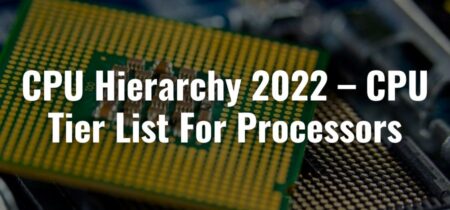Here is a brief answer to; How does RAM affect computer performance?
One of the most basic parts of any computer is RAM after CPU and GPU. It’s short for random access memory, and it’s the component that holds data when you’re using a program or browsing the internet.
Tasks like watching a movie, editing photos, or playing games require lots of data to quickly pull in and out of memory. Without enough RAM, your computer will start to slow down or crash.
How does RAM affect computer performance?
If you’re like most computer users, you probably look at the amount of RAM memory on a system as one of the major factors in determining how fast it is. This is because the more RAM you have, the more data you can have stored in your computer’s short-term memory. Does the Brand Of RAM Matter?
More data stored in short-term memory means that more operations can be performed at one time before having to wait for something else to happen first. It’s sort of like adding lanes to a highway; the more lanes there are, the more cars can fit on the road at once without slowing each other down.
How much RAM should you have?
In this fast-paced world, where we have a lot of applications running simultaneously, and multitasking is unavoidable, we need computers with large amounts of RAM (Random Access Memory), so they don’t crash every time we run intensive software. DRAM Frequency And How To Set It Properly?
What can you do to improve the RAM? Troubleshoot your memory
There are a few ways to figure out if your computer’s RAM is causing problems. Suppose you’re using Windows 10 or Windows 8, press Ctrl + Alt + Del and choose “Task Manager” from the menu that appears. Click the “Performance” tab in the Task Manager window, then look at the “Processes” list on the left side of the window.
Any process that has anything to do with your browser (Chrome, Firefox, or whatever) will likely be taking up a good chunk of available memory — if you have a lot of open tabs and windows, this list may scroll for pages. The column labeled a “Memory (working set)” tells you how much free memory is available to that process.
You can also try opening up a few programs and then closing them again; watch for error messages about not being able to close because there isn’t enough memory available. Any program that’s still running uses memory even if it isn’t opened in front of your screen. How To Choose RAM for A Gaming PC?
Does RAM speed affect performance?
This question often comes up in comments and forums when people are talking about their computer hardware. The general consensus is that faster memory doesn’t necessarily improve performance. Is this true?
Tests have proven that faster memory can make a difference, so the answer to the question “Does RAM speed affect performance?” is a definitive Yes or maybe No. Let’s explore why this is the case and how you can benefit from faster memory. How Much RAM Should I Allocate To Minecraft?
TEST 1:
We pitted two different DDR3 modules against each other in ASUS’ P8Z77-V Premium motherboard, which supports Intel’s Ivy Bridge processors. The first module had a rated frequency of 1600 MHz and timings of 10-10-10-27. The second module was rated at 1866 MHz and has similar timings – 10-10-10-27. In order to eliminate any potential bottleneck, we paired the modules with an Intel Core i7-3770K processor running at 3.5 GHz, and 8 GB (2×4 GB) of DDR3 memory rated for 1866 MHz running at 1333 MHz (DDR3 1600 MHz C9). We used Windows 10 64 bit as the operating system and tested the performance of the system in two scenarios:
Scenario 1: Maxed out multi-core processing power by running a series of benchmarks that put the most stress on the CPU, and we were able to witness the DDR3 1866 MHz king edging ever so slightly.
Scenario 2: Single core processing power by running various only single-threaded benchmarks such as SuperPi and Wprime.
In both cases, RAM speed had no noticeable impact on CPU performance. This is expected since there are plenty of factors that affect CPU performance.
Is it better to have a lower-speed RAM or a higher-speed RAM?
It depends. The speed of your memory depends on the frequency of the memory and the width of the memory module. Integers between 200 and 2133 mean the MHz is 200, while 3200 implies that this is the third generation of DDR RAM.
RAM compatibility with motherboard and CPU:
Checking RAM compatibility is one of the first things you should do when building a new motherboard or computer. If you’re using a desktop, you’ll have an easier time checking for compatibility because you can open up the case and look at the motherboard. If you’re using a laptop, it’s more difficult to check compatibility (but it’s not impossible).
When checking compatibility, you’ll want to pay attention to the type of memory your motherboard supports. If your motherboard only supports DDR3 RAM, you’ll want to make sure any RAM sticks you buy are DDR3 compatible. Also, if your CPU supports dual-channel memory, be sure that any RAM stick you buy is also dual-channel compatible.
If you’re fine-tuning your build, here’s what else to keep in mind:
Size matters: Keep in mind that not all RAM sticks are created equal — they come in different sizes and speeds. While most motherboards support DDR3 RAM in general, they might not support larger sizes or faster speeds. But as of 2023, DDR4 is the most common RAM memory supported by all the newest motherboards.
Conclusion:
In conclusion; How does RAM affect computer performance? It won’t take a hit on your computer’s performance in most situations, but it will affect the performance of specific programs to which you allot more RAM.

![How To Fix A CPU Cooler Not Lighting Up? [New Guide 2023]](https://www.drtechreviews.com/wp-content/uploads/2022/07/How-To-Fix-A-CPU-Cooler-Not-Lighting-Up-450x210.jpg)

![Why Is My CPU Cooler So Loud? [Facts 2023]](https://www.drtechreviews.com/wp-content/uploads/2022/07/Why-Is-My-CPU-Cooler-So-Loud-450x210.jpg)
![Fix Dual Monitor Lag In Windows [Explanation For Beginners]](https://www.drtechreviews.com/wp-content/uploads/2022/07/Fix-Dual-Monitor-Lag-In-Windows-450x210.jpg)
![Fix A Monitor Randomly Loses Signal [Problems & Solutions 2023]](https://www.drtechreviews.com/wp-content/uploads/2022/07/Fix-A-Monitor-Randomly-Loses-Signal-450x210.jpg)